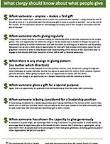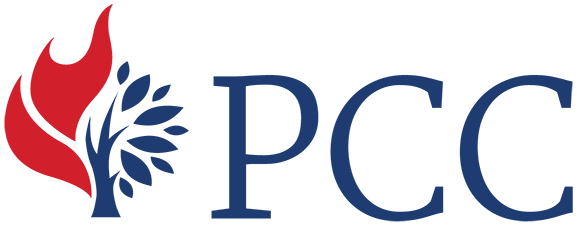What clergy should know about what people give
by Karen Plater, Associate Secretary, Stewardship & Planned Giving
How much should clergy know about what the people in their congregation give?
Informed Clergy Associated with Financial Growth
A recent study by The School of Philanthropy at Indiana University found that of more than 3000 diverse congregations, half reported that their minister knew who was giving and how much they gave. Interestingly, it also found that congregations whose clergy were uninformed about congregational giving were more likely to experience financial challenges while those in which clergy were actively aware were more likely to be growing financially.
In the book Not Your Parent’s Offering Plate, Clif Christopher argues that not knowing giving data makes the minister “far less effective and tends to make money a bigger issue in the church than ministry.” He explains, “Knowing what someone gives will tell you more about what they are committed to than anything else. As the Bible noted, treasure and heart go together.”
Louis B. Weeks, president emeritus of Union Presbyterian Seminary, and author of All for God’s Glory: Redeeming Church Scutwork (Alban) says that ministers and lay leaders should know what people in the congregation give. He argues that in most congregations, “the pastor is the best placed person to learn and teach about discipleship and giving.” Having less secrecy has the added benefit of protecting against embezzlement and provides more ownership over the mission of the church.
Giving is a Spiritual Practice
There was a time when congregations printed lists annually of not only who gave, but also what they gave. Now, many Presbyterian congregations across Canada severely restrict information about givings to just a few people. Some reasons for this cultural shift include tradition, concerns about privacy and protection for both clergy and the giver or non-giver.
Some argue that clergy may treat people differently if they know what is given, even though this concern does not come up with other intimate disclosures of information. However, even if ministers don’t know what someone gives, they are probably making subconscious assumptions anyway. Weeks suggests that “ministers can lean toward preferential treatment of people on the basis of perceived, rather than actual giving” and suggests that knowledge is better than ignorance. The Reverend Canon Charles LaFond, reflecting for the Episcopal Network for Stewardship’s newsletter, argues that good clergy will discern the appropriate weight to give to giving data in the context of pastoral care.
These authors all point to the idea that clergy and a few trustworthy lay leaders should know what their fellow Christians give, so that these leaders can do their jobs. This is because giving is a spiritual practice, like prayer. Christopher argues that Christ spoke frequently about money, particularly to the rich, because he saw how easily money could pull them away from the kingdom of God. Giving was an antidote to that pull.
At a Minimum, Know Giving Patterns
At the very least, it can be helpful for the minister and session to know the overall giving patterns in the congregation: how many people are giving at each level and when they give. For example, if only 50% of the households in the congregation are giving, this might indicate that there are opportunities for preaching and teaching about faithful giving and the joys of generosity.
Take Note of Change
Clergy and key lay leaders could also be informed when someone makes a first gift, when someone starts to give regularly and when a gift is made for a special purpose to ensure thanks are given and to help assess the potential to ask for more.
Flagging changes in giving patterns – in either direction – can help build relational connections and provide good pastoral care. A decrease could indicate a job loss, a pending divorce, illness or family distress. It could also be a sign that the person is considering leaving the congregation. An increase can be an affirmation of ministry and a reason for a special thank you.
Giving and Leadership
There are also arguments for the minister to know what individuals give when they are being considered for leadership positions. “if you are going to have a church that practices stewardship, and I should probably say discipleship, in an exemplary way, you have to begin with a pastor who is willing to be a steward and then staff and key lay leaders who are willing to be examples.” Christopher explains. It shouldn’t be the only sign of discipleship considered, but it can be one factor that helps the minister understand the candidates’ spiritual lives.
Be Open About Your Church’s Policy
There isn’t a one-size-fits-all answer, but that it is useful to have prayerful conversation and to make an intentional decision about the appropriate and inappropriate uses of giving records, the differences between secrecy and confidentiality, and who is making the decisions.
Sessions (which include the minister) should decide what the minister needs to know and develop policies that are accessible and transparent. A session should examine job descriptions of committee members to determine who knows what and to ensure that those with access to the information treat it with confidentiality and use it solely for church duties. Privacy is particularly important today – and anyone who handles donor information must understand what can and cannot be done with the information.
4 ways clergy can support healthy, mature generosity
1. Articulate a theology of giving, gratitude and generosity.
2. Model the spiritual practice of generosity by sharing their own practices in this area.
3. Invite others to join them in the spiritual practice of giving, gratitude and generosity.
4. Model a spirit of gratitude by thanking often.
Approach Change Carefully
Changing the culture of a congregation might have unexpected consequences if not approached carefully. If a congregation is changing their policy, there must be good communication and carefully thought out reasons given for the change. There is no point in changing a policy if the minister doesn’t want the change, if there is conflict and mistrust in the congregation, or if it isn’t clear how the information will be used. Congregations may also want to consider ways people could choose to give anonymously (without the minister knowing), if that is their wish.
Clergy and treasurers may want to talk to their peers to share their experiences and learnings. Open conversation may help efforts in building faithful and generous congregations. Handled well, if clergy know about church finances and what people give, it is possible to bridge the divide between the financial life and the spiritual life of the congregation.
Resources

What Clergy Should Know About What People Give
Helps sessions discuss and individuals answer the question: “What is the basic giving information that should be made available to the minister and leaders of a church?”
Bibliography:
Not Your Parent’s Offering Plate (Abingdon Press) by Clif Christopher
https://www.abingdonpress.com/product/9781501804922/
“Why Clergy Should Know What People Pledge” by The Reverend Canon Charles LaFond on
“The 2013 Congregational Economic Impact Study”, School of Philanthropy, Indiana University. https://scholarworks.iupui.edu/server/api/core/bitstreams/ce0d0808-7e2d-4aaf-9562-a06ef4cb48ab/content
For more information about Stewardship & Planned Giving, send us an email or call 1-800-619-7301.


